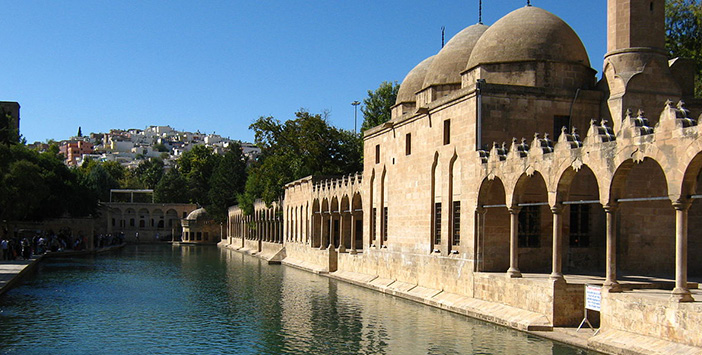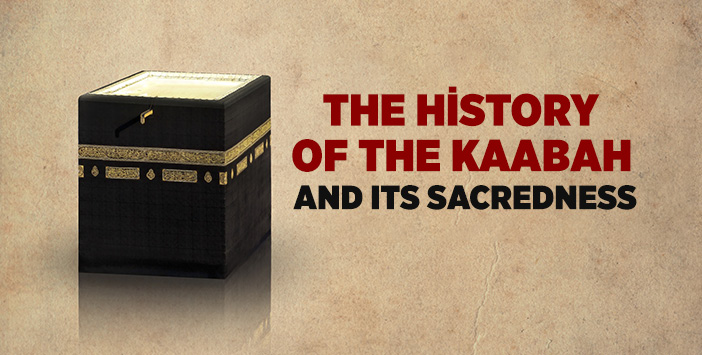Who is the hanif Prophet Ibrahim –upon him be peace-? What are Hanif or monotheism means? What is Prophet Ibrahim (Abraham) story? The Hanif Prophet Ibrahim –upon him be peace- and the religion of worshipping one god…
Although most of the people of Mecca had become idolaters, traces of belief in one God were not completely eradicated. A few people still practicing the religion of tawhid, as taught by Ibrahim –upon him peace- were still to be found. Ibrahim –upon him peace- is considered in Islam as Khalîlullâh, the friend of Allah, and also among the five grand Prophets, referred to as Ulu’l-Azm. The great-grandfather of the Blessed Prophet -upon him blessings and peace-, Ibrahim –upon him peace- is also known to have received ten leaves (suhuf) of Revelation from the Almighty.
PROPHET IBRAHİM (ABRAHAM) STORY
The name Ibrahim is mentioned throughout twenty-five chapters in the Quran, at a total of sixty nine times. Some of the attributes mentioned in praise of him in these verses include awwâh (sigher, referring to compassion), halîm (forbearing) munib (penitent), qanit (excellent in servitude to the Almighty), shakir (thankful) and hanîf.
The religion of Ibrahim –upon him peace- is called Hanîf. It means to leave crooked ways for the right path, to give up heretical beliefs for belief in One God, and become a muwahhid, one who recognizes the unity of the Almighty.
The Almighty states in the Holy Quran:
“And they (Christians and Jews) say: Be Jews or Christians, you will be on the right course. Say: Nay! (we follow) the religion of Ibrahim, the Hanif, and he was not one of the idolaters!” (al-Baqara, 135)
“Ibrahim was not a Jew, nor yet a Christian; but he was an upright man, the Hanîf who had surrendered (to Allah); and he was not of the idolaters.” (Âl Imrân, 67)
During the phase of Ignorance, the term Hanif was used to refer to anyone who rejected the worship of idols and, espousing belief in One God, followed the religion of Ibrahim. Included among the Hanif were people like Waraqa ibn Nawfal, Abdullâh ibn Jahsh, Othman ibn Huwayrith, Zayd ibn Amr and Quss ibn Sâida, who throughout their lives remained adamant in refusing to bow down in front of idols or pray to them as gods.
Ibn Omar -Allah be well-pleased with them-[1] narrates:
“The Prophet -upon him blessings and peace- was invited to a meal near the valley of Baldah;[2] this was before any Divine Revelation had come to the him. Present at the meal was also Zayd ibn Amr ibn Nufayl. Just as the Blessed Prophet -upon him blessings and peace- refused to eat from the meat which he was offered, so did Zayd, who explained:
‘I do not eat anything which you slaughter in the name of your stone idols. I eat nothing but that which is slaughtered in the name of Allah.’
Zayd ibn Amr was known for his criticism of the way Quraysh used to slaughter their animals, which he considered something abominable, saying:
‘Allah has created the sheep, has sent the water for it from the sky, and has grown from the earth for it to eat; and yet you slaughter it in the name of another than Allah.’”. (Bukhârî, Manâqıbu’l-Ansâr, 24; Dhabâih, 16)
According to another narration from Ibn Omar:
“Zayd ibn Amr ibn Nufayl had gone to Damascus to inquire about a true religion to follow. There, he met a Jewish religious scholar and asked him about their religion.
‘I intend to embrace your religion, so tell me something about it,’ he said.
‘You cannot embrace our religion unless you receive your share of the Wrath of God,’ replied the Jew.
‘I have not come here except from fear of His Wrath, so I cannot see myself bearing a bit of it, given I have the power to avoid it. Can you tell me of some other religion?’
WHAT İS THE HANIF?
‘I know of no other religion except the Hanif.’
‘What is the Hanif?’ then Zayd further asked.
‘Hanif is the religion of the Prophet Ibrahim, neither a Jew nor a Christian, who used to worship Allah alone’, explained the Jewish scholar.
Zayd then headed out and met a Christian scholar and stated the exact concern.
‘You shall not embrace our religion unless you get a share of the Curse of God,’ the Christian responded.
‘I run from none other than His Curse, and I will never bear any of it so long as I have the power to avoid it. Can you tell me of some other religion?’ Zaid asked.
‘I do not know of any other religion except Hanif.’
‘Which is…?’
‘It is the religion of the Prophet Ibrahim who was neither a Jew nor a Christian and who worshipped none but Allah’.
Hearing similar words from both regarding the religion of Ibrahim –upon him peace-, Zayd left that place, and raised both his hands to the skies, as he came out, and said:
‘O Allah! Bear witness that I am in the religion of Ibrahim.’” (Bukhârî, Manâqıbu’l-Ansâr, 24)
Asma bint Abi Bakr –Allah be well pleased with her- reports to have seen Zayd ibn Amr ibn Nufayl, standing with his back against the Kaabah, declaring:
“People of Quraysh! By Allah, none among you is in the religion of Ibrahim except for me.”
She adds that Zayd took great care to preserve the lives of little girls, salvaging their lives from a horrific death. Upon seeing a man with the intention of slaying his daughter, he would intervene and say:
“Do not kill her! I will feed her on your behalf.” So he would take her and look after her, and when she would grow up, Zayd would say to her father:
“If you want her now, I will give her to you, and if you wish, I will keep on looking after her on your behalf.” (Bukhârî, Manâqıbu’l-Ansâr, 24)
As regards Waraqa, another prominent Hanif, the Messenger of Allah -upon him blessings and peace- has said:
“I see him walking around in Paradise in a silk gown.”
And about Zayd:
“He will be resurrected in the Hereafter as a separate nation between me and Isa.” (Haythamî, IX, 416)
With knowledge of the previous Sacred Books, the Hanîfs had a feel that the approach the Final Prophet -upon him blessings and peace- was near and they were waiting in longing anticipation.
Most Muslim scholars are of the opinion that the parents of the Messenger of Allah -upon him blessings and peace- were also among the Hanîf, a religion that is nothing but belief in the one true God, in tawhid. Such is why the Almighty commands the observance of the religion of Ibrahim –upon him be peace-, the quintessential Hanif, in the following verse:
“Then We revealed to you: Follow the faith of Ibrahim, the upright one; he was not of the idolaters.” (an-Nahl, 16:123)
The term Hanif is also used to signify Islam and every sincere Muslim is thus also called a Hanîf. The Blessed Prophet -upon him blessings and peace- states, in confirmation:
“I was sent with the forebearing Hanif religion.” (Ahmad, V, 266)[3]
Source: Osman Nuri Topbaş, The Prophet Muhammed Mustafa the Elect, Erkam Publications
[1] Abdullah ibn Omar –Allah be well-pleased with them- was born in the 3rd year of Prophethood. He made the Hegira with his father Omar –Allah be well-pleased with him-. Along with Abu Ayyub al-Ansari, he was member of the army that was to lay siege to Istanbul. As his elder sister Hafsa –Allah be well-pleased with her- was the wife of the Noble Messenger -upon him blessings and peace-, he had the privilege of being in the close company of the Prophet -upon him blessings and peace-. A narration of 2630 hadiths, together with repetitions, makes him second to Abu Hurayrah –Allah be well-pleased with him- on the list of the mukthirun, the seven Companions with the most number of hadith narrations. Ibn Omar –Allah be well-pleased with them- was likewise among the seven Companions to give the most number of fatwa, jurisprudential verdicts.
He was second to none, however, in following the lifestyle of the Messenger of Allah -upon him blessings and peace- to the letter, in implementing his commands in their exactitude. After the passing away of the Blessed Prophet -upon him blessings and peace-, stemming from an exuberant love for him, Ibn Omar would specifically offer salat in the exact spots where the Prophet had once offered it; he would walk the paths he had trodden, sit in the shades of trees the Messenger of Allah -upon him blessings and peace- used to sit beneath, purposely watering them so they would not dry out. (Bukhari, Salat, 89; Ibn Hajar, al-Isâba, II, 349)
He once suffered a major cramp in his foot. Abdurrahman ibn Saad, next to him at the time, advised him to say the name of the person he most loved.
“Muhammad!” exclaimed Ibn Omar, immediately upon which he foot was relieved of pain. (Ibn Saad, IV, 154)
Ibn Omar –Allah be well-pleased with him- was also among the wealthiest of the Companions. That so, he would never allow his wealth to accumulate, distributing it among the poor as soon as he would get his hands on it himself. He had a habit of sparing his favorite possessions for charity in the way of the Almighty. He had also begun setting free all his slaves, who developed praiseworthy behavior, especially those who had begun to regularly perform salat. For this, Ibn Omar was cautioned by one of his friends, informing him that one of his slaves was frequenting the mosque just to be set free. Ibn Omar’s response, showing the depth of Divine love in his heart, is splendid:
“We are willing to be tricked by those wishing to trick us with Allah!”
He is reputed to have set free over 1,000 slaves, for numerous reasons and under different circumstances. He passed away in Mecca in 692, (H. 73) at the age of 85.
[2] Baldah is a valley nearby Mecca.
[3] Also see, Bukhari, Iman, 29.




